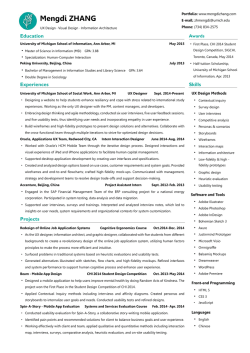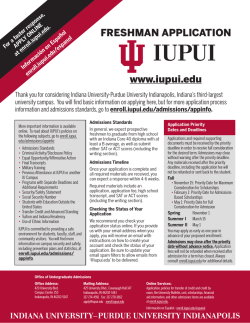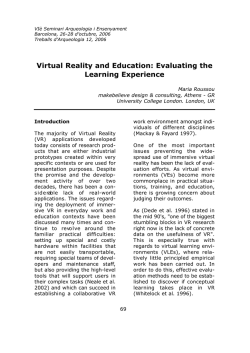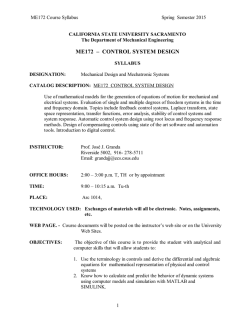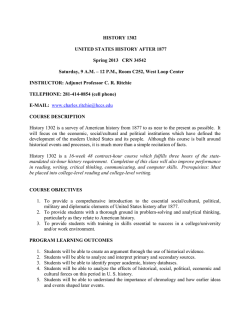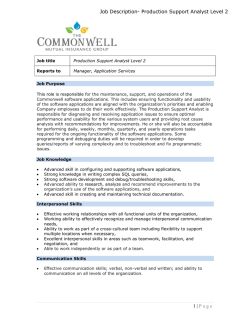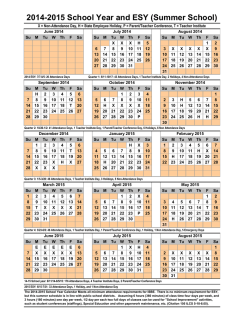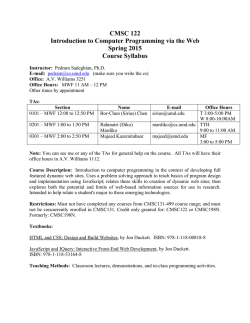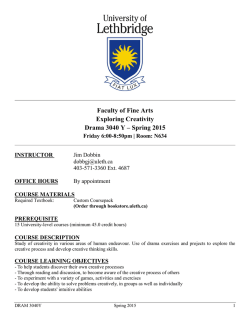
Sample Syllabus - Informatics at IUPUI
N450 Usability Principles for New Media Interfaces Indiana University School of Informatics - IUPUI Course Info: 3 Credit Hours COURSE DESCRIPTION: Examination of principles of human-computer interaction (HCI) and user experience modeling. Study of user-centered design, usability, and usability testing in the context of new media (hypermedia and multimedia). Topics include aesthetics, human factors, and cognitive psychology as related to user interfaces, navigation, and interactivity. PREREQUISITE: None REQUIRED TEXTBOOK • Design Web Sites that Work: Usability for the Web o Gerble, Brinck, and Wood o 1-55860-658-0 o Morgan Kaufmann Publishers MISSION STATEMENT The Mission of IUPUI is to provide for its constituents excellence in Teaching and Learning, Research, Scholarship, Creative Activity, and Civic Engagement. With each of these core activities characterized by: 1) collaboration within and across disciplines and with the community, 2) a commitment to ensuring diversity, and 3) pursuit of best practices. IUPUI’s mission is derived from and aligned with the principal components – Communities of Learning, Responsibilities of Excellence, Accountability and Best Practices – of Indiana University’s Strategic Directions Charter. STATEMENT OF VALUES IUPUI values the commitment of students to learning; of faculty to the highest standards of teaching, scholarship, and service; and of staff to the highest standards of service. IUPUI recognizes students as partners in learning. IUPUI values the opportunities afforded by its location in Indiana’s capital city and is committed to serving the needs of its community. Thus, IUPUI students, faculty, and staff are involved in the community, both to provide educational programs and patient care and to apply learning to community needs through service. As a leader in fostering collaborative relationships, IUPUI values collegiality, cooperation, creativity, innovation, and entrepreneurship, as well as honesty, integrity, and support for open inquiry and dissemination of findings. IUPUI is committed to the personal and professional development of its students, faculty, and staff and to continuous improvement of its programs and services. COURSE OBJECTIVES By the end of this course, students will be able to: 1. Explain terms and concepts related to the following range of interface design and usability topics: • Usability theory and the applied techniques N450 Usability Principles for New Media Interfaces 1 • A user-centered approach to interaction design • Principles of the interface design and prototyping processes • Information architecture and content management • Classic user testing theory and tools 2. Design a Web site up to the dynamic prototype stage by applying usability principles and models: • Apply pre-design and post-design usability testing techniques on the developed Web site. • Collect and analyze the testing data. • Write a comprehensive report on the product development process of a Web site. CORE COMPETENCIES This course follows the Principles of Undergraduate Learning http://clas.iupui.edu/undergraduatelearning.html Specifically, this course enhances the following principles: − Core Communication and Quantitative Skills − Critical thinking − Writing skills − Oral presentation − Integration and Application of knowledge (emphasized) − Intellectual depth, breadth, and adaptiveness − Understanding of society and culture − Values and ethics COURSE TEXT, READING, and CLASS DISCUSSIONS, QUIZZES, PROJECTS Assessing Your Comprehension of the Weekly Reading We will cover approximately one chapter per week from the course texts. Each student should not only read but arrive at a competent understanding of the materials. Three measures will be used to assess learning competency from the weekly readings: • Weekly quizzes will be given to assess learning and comprehension. • Weekly discussions, directed by specific questions, will be given in an open class discussion format, either in class or in an online forum. During this time the instructor will challenge student comprehension, while adding practical applications to the theoretical content. • A final paper and/or project report will be assigned in which students will summarize and integrate theories and project assignments from the semester-long reading assignments. N450 Usability Principles for New Media Interfaces 2 COURSE STRUCTURE OVERVIEW The course structure is composed of four parts: • Lectures / discussion time • Quizzes • Projects - The instructor will review project progress of the students during class time while the students are still available. GRADING Project Evaluation I. REQUIREMENTS ANALYSIS • User needs analysis • Competitive analysis • User/stakeholder analysis II. CONCEPTUAL DESIGN • Hybrid task analysis: Task hierarchy analysis • Card sort technique • Old and new information architecture analysis III. MOCKUPS & PROTOTYPING • Interface thumbnail (mini) sketches on paper • Using mockup checklist and schedule • Interface rapid prototypes on paper IV. PRODUCTION • Preparing and editing site content, text and graphics • Use writing checklist • Executing dynamic prototype of web site • Launching site on time and complete V. USABILITY TESTING & EVALUATION • Heuristic Inspection • Usability testing and taping (Think-Aloud Technique) • User profiling questionnaire • Product questionnaire • Test script and use of all other worksheets and forms • Post test interview session • Focus group session • General data gathering and analysis VI. FINAL REPORT o 15% Final analysis and making recommendations o 10% Final Report Presentation Class participation (Quizes and attitude / investment in course) 5% 10% 10% 10% 20% 35% 10% Grade Scale A+ A A– B+ B B– C+ C C– D+ D D– F 97 – 100 93 – 96.99 90 – 92.99 87 – 89.99 83 – 86.99 80 – 82.99 77 – 79.99 73 – 76.99 70 – 72.99 67 – 69.99 63 – 66.99 60 – 62.99 Below 60% N450 Usability Principles for New Media Interfaces 3 Grade Review at the Midterm: Students will be shown their midterm grades at midterm. If students want to see their grades at any other time during the semester, they should contact the Instructor by email and the Instructor will send them the grades by email. POLICIES for ATTENDANCE & ASSIGNMENT/PROJECT DEADLINES 1. 2. Missing class WILL impact your grade. (For in-class students only.) Students are allowed two (excused or unexcused) absences before their grade will be effected. In other words, whether you are sick or have personal problems or issues for missing class, it will amount to the same. Missing class means you do not show for the whole or majority of the session. The grade reduction policy works in this way. • On the third missed class time your final grade will drop 5 points (regardless of the reason). • On the fourth missed class your final grade will drop 10 points (regardless of the reason), and 5 additional points thereafter for each additional class missed. Responsible for due dates and related materials: All weekly due assignments are each student’s responsibility. If class is missed, the student is still responsible for the assignment, as well as to find out what was covered in class, e.g., any new assignments or variations to an existing assignment. ALL assignment deadlines are outlined in the syllabus or syllabus supplemental documents provided on OnCourse. Ultimately, each student is responsible for the deadline. Also, weekly assignment deadlines should be adhered to, to insure fairness to all students. For the purpose of maintaining an equal and fair evaluation of each student’s work, no student will receive special treatment. As a result, the following rules will apply to this course: • All assignments must be submitted through OnCourse at the designated time as stated on the assignment sheet, as communicated via email, or on the syllabus. • All assignments (projects) handed in late will be reduced 10 points for every day late (24 hrs. from the due date and time). For example, if the assignment is due at 6PM on the due date and it is post-marked 6:01PM, it will be reduced automatically by 10 points. If the class meets in the class room, students must be ready to hand the assignment in at the start of class time. • Incompletes will NOT be issued except under very extreme personal conditions that have been reviewed by the instructor and in some cases in consultation with the Dean’s Office. UNIVERSITY POLICIES (* Does not apply to online students.) 1. University Attendance Policy:* Attendance is required. The University regulations state: “Students are expected to be present for every meeting of the classes in which they are enrolled.” IUPUI faculty are required to submit to the office of the Registrar a record of student attendance through the semester, on which they will take action if the record conveys a trend of absenteeism. As a result, ATTENDANCE WILL BE TAKEN IN ALL CLASSES. An attendance sheet will be passed out in class for each student to sign their name. If you do not sign your name while in class you will be marked absent. The instructor is not expected to remember who attended when, so signing the sheet while in class is important. Signing the attendance sheet for another student is absolutely prohibited. Any student found doing so will be in violation of university policies on ethics and/or conduct. 2. Bringing your children to class: * University Policy states that: “Children are not permitted to attend class with parents, guardians, or childcare providers. This conduct has the effect of unreasonably interfering with an individual’s work or academic performance creating an offensive learning environment.” “A student must not violate course rules as contained in a course syllabus, which are rationally related to the content of the course or to the enhancement of the learning process in the course.” [Code of Student Rights, Responsibilities, and Conduct, page 29] 3. Academic Dishonesty / Integrity / Plagiarism: Using another student’s work on a project or assignment, cheating on a test, or any other form of dishonesty or plagiarism will result in a grade of zero on that assignment and possibly an "F" in the course, and will be referred to the Dean of Students. All students should aspire to high standards of academic honesty. This class encourages cooperation and the exchange of ideas. For further reference, students may see: http://life.iupui.edu/dos/code.htm 4. Values and ethics: Profanity or derogatory comments about or towards the instructor or any member of the class will NOT be tolerated. Violating this rule will result in a warning and if the offense continues, administrative action will be taken. N450 Usability Principles for New Media Interfaces 4 5. Code of Student Rights, Responsibilities and Conduct: All students are responsible for reading, understanding, and applying the Code of Student Rights, Responsibilities and Conduct of IUPUI. (Students can access www.iupui.edu/code for further information regarding the above points.) 6. Disabilities Policy: In compliance with the Americans with Disabilities Act (ADA), all qualified students enrolled in this course are entitled to "reasonable accommodations." Please notify the instructor during the first week of class of any accommodations needed for the course. Students with learning disabilities must provide written verification for this policy to be recognized. N450 Usability Principles for New Media Interfaces 5
© Copyright 2026
